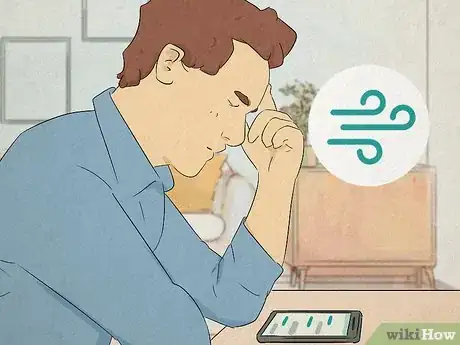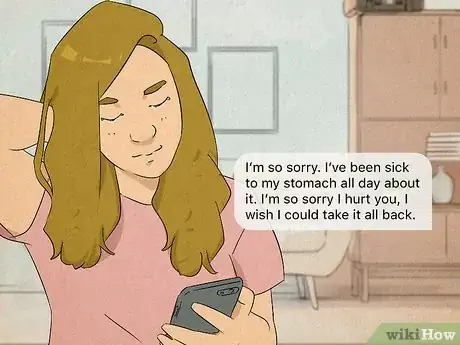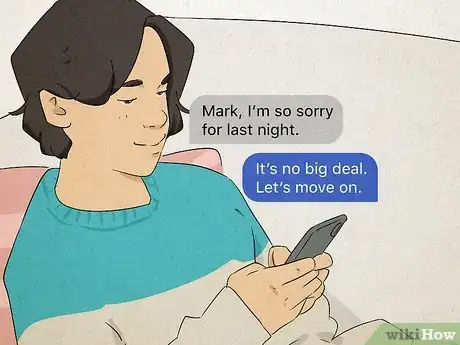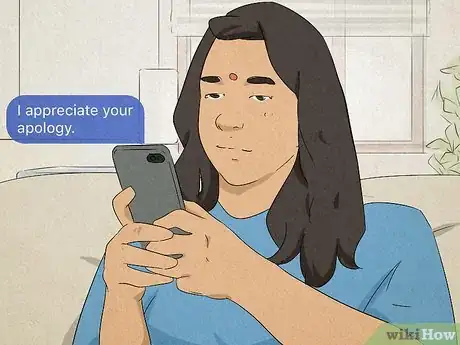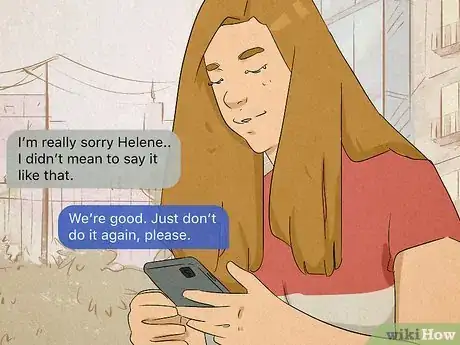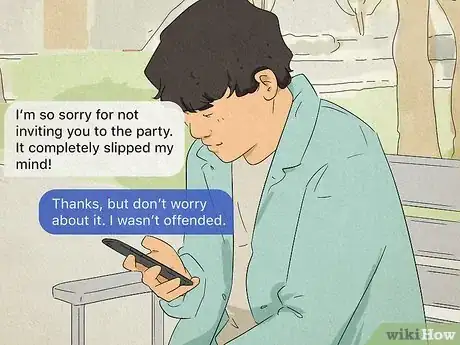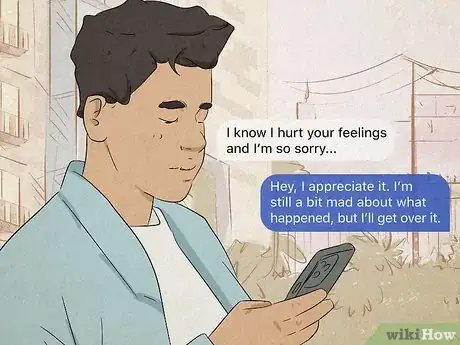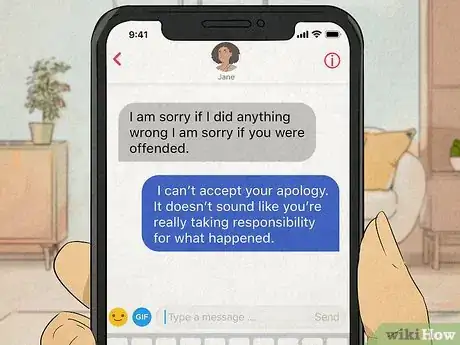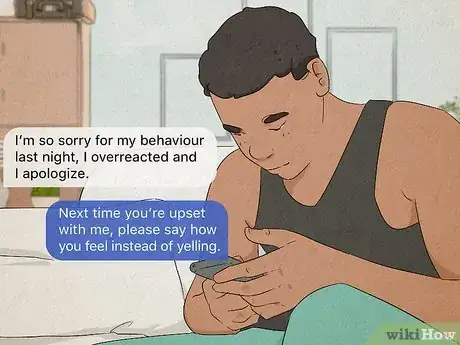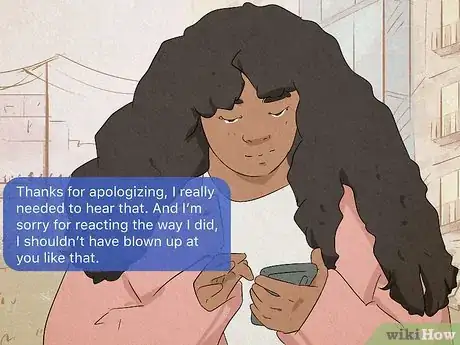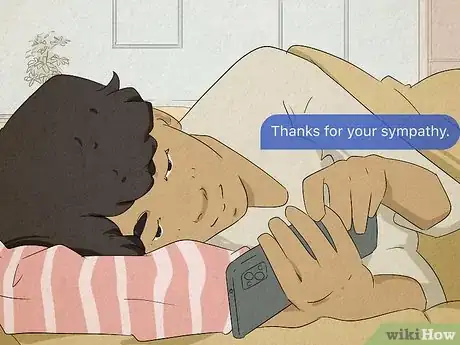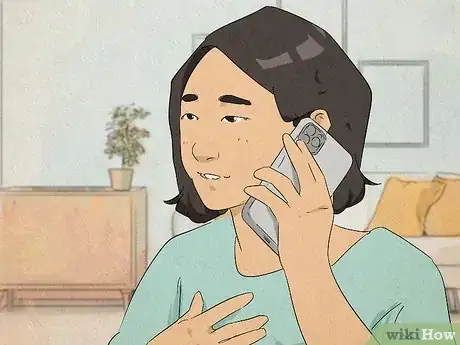This article was co-authored by Julianne Cantarella and by wikiHow staff writer, Megaera Lorenz, PhD. Julianne Cantarella is a Dating Coach, Certified Life Coach, Licensed Social Worker, and the CEO and President of New Jersey's Matchmaker. With over a decade of experience, she specializes in helping women heal from a heartbreak and create healthy long-term relationships. Julianne created a comprehensive transformational date coaching program From First Date to Soulmate™ that has helped hundreds of women find love. She holds a Bachelor of Social Work (BSW) from Ramapo College of New Jersey and a Master of Social Work (MSW) from Fordham University. Julianne has contributed to numerous media such as Your Tango Online Magazine, 24Seven Wellness Magazine, and Talk of The Town Magazine. She has also been featured as a relationship expert on CBS, iHeartRadio, and PBS “This Emotional Life Project.”
There are 12 references cited in this article, which can be found at the bottom of the page.
This article has been viewed 197,223 times.
It can be hard to know what to say when someone apologizes to you, especially if they say “sorry” over text instead of in person. In this article, we’ll talk you through how to recognize a sincere apology and give you some tips on how to reply—whether you accept the apology or not.
Steps
Give yourself time to calm down.
-
Don’t respond in the heat of the moment. If you’re still mad at the other person, you might be tempted to react to their apology with an angry text. Unfortunately, it’s all too easy for angry texting to spiral out of control into a hurtful argument.[1] X Research source To avoid saying something you might regret, put the phone down for a little while and think about what you want to say.
- Take a few minutes—or even a day or two, if necessary—to process your feelings before you answer.
Look for signs that the apology is sincere.
-
A good apology should be unconditional. It can be really hard to pick up on someone’s tone over text, which is why it’s not the ideal way to give (or respond to) an apology. Still, the actual words of the apology can help you figure out if it’s sincere or not.[2] X Trustworthy Source Greater Good Magazine Journal published by UC Berkeley's Greater Good Science Center, which uses scientific research to promote happier living Go to source A good apology should:[3] X Trustworthy Source Greater Good Magazine Journal published by UC Berkeley's Greater Good Science Center, which uses scientific research to promote happier living Go to source
- Express remorse. For example, “I feel terrible about what I did yesterday.”
- Take responsibility for what they did and recognize the impact it had. For instance, “I understand that what I said was insensitive, and that it really hurt you.”
- Attempt to make things better, e.g., by promising not to repeat the action or offering to make it up to you somehow.
- Avoid making excuses, minimizing what they did, or blaming you for what happened. For example, a good apology should not include phrases like, “I’m sorry, but I wouldn’t have said that if you hadn’t upset me,” or “I’m sorry if you were offended.”[4] X Research source
Be direct and brief.
-
However you respond, keep it simple. Texting was designed for quick and easy communication, so it’s not the place to write a detailed essay about your feelings.[5] X Research source Whether or not you accept their apology, give them a short answer that gets straight to the point.[6] X Research source
- For example, you could say something simple, like, “Thanks for apologizing. That means a lot to me.” Or, “It’s no big deal. Let’s move on.”[7] X Research source
Tell them you appreciate the apology.
-
It takes courage to apologize, even over text. If the apology is sincere, let them know that you recognize their effort—even if you’re still a bit upset.[8] X Research source [9] X Expert Source

Dating & Relationship Coach Expert Interview. 6 August 2021. Try saying something like:- “I appreciate your apology.”
- “Thanks for saying that.”
- “What you did really hurt me, but it means a lot that you said sorry. Thank you.”
Accept the apology if you forgive them.
Try a casual reply if it’s no big deal.
-
Let them know if you’re not that upset. Try to keep the tone of your answer appropriate to the seriousness of what happened (and your own feelings about it).[11] X Research source If they’re just sending a quick apology for a minor mistake or misunderstanding, try something like:
- “No worries!”
- “Thanks, but don’t worry about it. I wasn’t offended.”
- “Hey, we all make mistakes sometimes. No biggie.”
Admit it if you’re still upset.
-
Sometimes healing takes time. Even if you accept the apology, it’s totally natural to still feel bothered by what happened. If that’s the case, be honest about how you’re feeling instead of trying to hide it or bottle it up. Being open will probably help you feel a little better, and it will also give the other person a better sense of where things stand between you.[12] X Research source
- For example, you might say something like, “Hey, I appreciate it. I’m still a bit mad about what happened, but I’ll get over it.” Or, “Ok, thanks for apologizing. It’s going to be a while before I feel better about things, but that helps.”
Let them know if you don’t accept the apology.
-
It’s okay to reject an apology sometimes. If their apology is insincere, or if you feel like it just isn’t enough to make up for what they did, let them know.[13] X Research source You can also tell them that you appreciate the apology, but you’re not yet ready to accept it.
- For instance, if you don’t feel like their apology was good enough, you could say something like, “No, I can’t accept your apology. It doesn’t sound like you’re really taking responsibility for what happened.”
- Or, “Thanks for apologizing, but I’m still really upset and I’m not ready to forgive you yet. Please give me some time.”
- If the apology is from someone who means a lot to you, consider giving them a second chance to apologize more sincerely. Explain what you’d need from them in order to accept the apology (e.g., “I need you to let me know that you understand why I’m so hurt.”).
Tell them what they can do to make things better.
-
An apology means more when it’s backed up by actions. Take a moment to talk about how you can both move on from what happened. You could suggest a compromise or make a gentle request for them to change their behavior in the future.[14] X Research source
- For example, you might say something like, “Next time you’re upset with me, please say how you feel instead of yelling.” Or, “I get that you were frustrated because I was taking too long, and I’ll try to be better about that. But in the future, just check in with me instead of leaving without me.”
Apologize for your own role in what happened.
-
There are usually two sides to a conflict. Think about what happened between you and the other person, and try to see things from their side. If there’s anything you could have done differently, acknowledge it. That way, you’re both more likely to come out of the situation feeling better about things.[15] X Research source
- For instance, say, “Thanks for apologizing, I really needed to hear that. And I’m sorry for reacting the way I did, I shouldn’t have blown up at you like that.”
Say thanks for a sympathy text if you feel like it.
-
If you’re grieving, you don’t necessarily have to respond. But if someone sends a message like, “I’m sorry for your loss,” or “So sorry to hear about what happened,” it’s reasonable to send them a quick acknowledgment if you feel up to it. For example, you might say something like:[16] X Research source
- “Thanks for your sympathy.”
- “Thank you, that means a lot.”
- “I appreciate your kind words.”
- “Thanks for being there.”
Call them if you want a more serious discussion.
-
Texting isn’t great for important conversations. If the person is apologizing about something pretty minor, or if you don’t have a lot to say in response, then shooting back a quick text might work okay. But if you want to have a heart-to-heart talk with them, it’s better to call or do it in person.[17] X Research source [18] X Expert Source

Dating & Relationship Coach Expert Interview. 6 August 2021.- You might send a message saying something like, “What happened yesterday is kind of a big deal, and I don’t want to talk about it over text. Can I give you a call?”
- You could also say, "Thanks so much your text, but I think this is something we should talk about in person."[19]
X
Expert Source

Dating & Relationship Coach Expert Interview. 6 August 2021.
You Might Also Like






References
- ↑ https://psychcentral.com/blog/why-you-shouldnt-text-your-argument#1
- ↑ https://greatergood.berkeley.edu/article/item/six_tips_for_reading_emotions_in_text_messages
- ↑ https://greatergood.berkeley.edu/article/item/the_three_parts_of_an_effective_apology
- ↑ https://www.psychologytoday.com/us/blog/make-it-right/202010/how-recognize-and-respond-fake-apology
- ↑ https://www.goodtherapy.org/blog/texting-teens-adults-communication-0726126
- ↑ https://psychcentral.com/blog/7-ways-to-give-an-apology-4-ways-to-accept-one#3
- ↑ https://www.goodtherapy.org/blog/how-to-accept-an-apology-without-making-things-worse/
- ↑ https://www.psychologytoday.com/us/blog/managing-your-mindset/201506/5-steps-apology-really-works
- ↑ Julianne Cantarella. Dating & Relationship Coach. Expert Interview. 6 August 2021.
- ↑ https://psychcentral.com/blog/7-ways-to-give-an-apology-4-ways-to-accept-one#1
- ↑ https://www.goodtherapy.org/blog/how-to-accept-an-apology-without-making-things-worse/
- ↑ https://www.goodtherapy.org/blog/how-to-accept-an-apology-without-making-things-worse/
- ↑ https://www.psychologytoday.com/us/blog/make-it-right/202010/how-recognize-and-respond-fake-apology
- ↑ https://www.psychologytoday.com/us/blog/managing-your-mindset/201506/5-steps-apology-really-works
- ↑ https://psychcentral.com/blog/7-ways-to-give-an-apology-4-ways-to-accept-one#3
- ↑ https://dying.lovetoknow.com/words-comfort-after-death/do-you-need-send-thank-you-cards-people-who-send-sympathy-notes
- ↑ https://digitalcommons.pace.edu/cgi/viewcontent.cgi?article=1188&context=honorscollege_theses
- ↑ Julianne Cantarella. Dating & Relationship Coach. Expert Interview. 6 August 2021.
- ↑ Julianne Cantarella. Dating & Relationship Coach. Expert Interview. 6 August 2021.
About This Article

